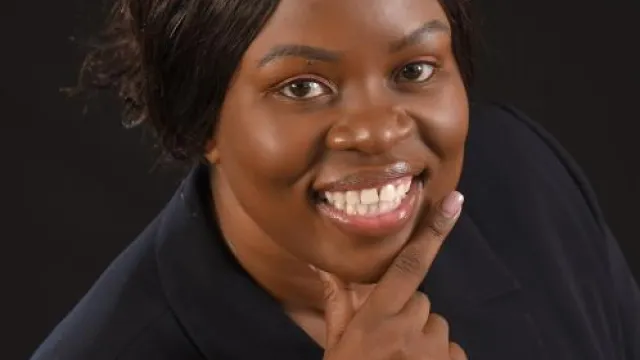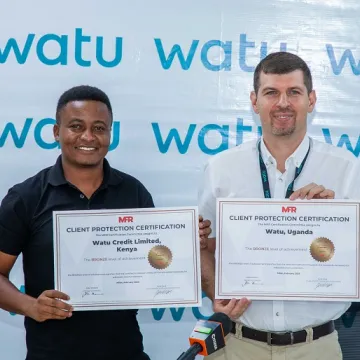Rose Osiemo, a top legal mind breaking fintech ceilings at Watu Credit

Rose Osiemo, the Head of Legal at asset financier Watu Credit.
As the world commemorates International Women’s Day, Maudhui House had the opportunity to speak with Rose Osiemo, a distinguished legal expert, who has seamlessly balanced discipline, career and family, earning a prominent place in corporate legal arena in Africa. Osiemo currently serves as the Head of Legal at asset financier Watu Credit:—
Who is Rose Osiemo?
I’m a seasoned legal practitioner with 15 years of experience, specializing in international trade and investments, with a minor in intellectual property. Over the years, I have honed my skills in advising corporates and framing legal solutions that drive business growth and compliance.
I have worked with four key organizations, navigating complex legal challenges and providing strategic legal counsel. Throughout my career, I have taken on leadership roles, mentoring junior practitioners, guiding my peers and shaping corporate legal frameworks.
But above all, I am a mother, a wife, a daughter, and a friend, roles that define me just as much as my professional journey.
What inspired you to into corporate and commercial law?
All through school, I believed I would pursue a career in medicine. But life had other plans, I was admitted to law school. My first semester was filled with uncertainty, and inner struggle. However, in the second semester of my first year, I fell in love with law. I discovered how accommodating and dynamic the field was, allowing me to think critically, express myself and explore new ways to solve problems and shape regulations.
By my fourth year, I had already decided to take the business route. I wanted to drive change in shaping business and business units in Kenya. That is why, immediately after finishing my undergraduate degree, I enrolled in a master's program at the same university, specializing in international trade and investments.
What has your career path been like?
I have worked with Kenya Data Networks, now Liquid Telecom, where I gained the foundation for who I am today. It was there where I learned about the corporate world and the steps I needed to take to rise through the ranks.
I established the Legal Department at Kenya Data Networks and the experience led me to display exceptional skill at Nestlé Equatorial African Limited where I took the already present Legal Department on to a whole new level, setting up new processes and requirements from my experience, to meet Legal objectives in the 21 countries that we had presence in. The department of just two people later grew in number and mostly in influence.
How did the two, the experience at Liquid Telecom and Nestlé, prepare you for your role at Watu Credit?
In both organizations, I started the legal departments from the ground up. This experience provided me with a smooth transition when joining Watu. However, moving from the technology sector to the consumer goods presented new challenges, even though the fundamental principles remained the same. Ultimately, the shareholders expect results.
You are technically a woman in tech. That seems to be evolving every minute due to the changing innovation. How is this panning out for you?
Being a woman in the financial services sector comes with the risk of being overlooked or unheard. This industry grows rapidly, and if you don't grow with FinTech, you risk becoming irrelevant.
When I joined Watu, I was fully aware that financial services, especially asset financing, were unregulated in Kenya, presenting both challenges and opportunities. I had to choose whether to be part of the problem or part of the solution — I chose the latter.
Today, I develop policies, assess legal risks, and drive solutions that foster growth. I embrace technology to ensure I remain at the forefront of industry advancements.
What would you tell a young lawyer getting into corporate and commercial law today?
There is no room for a victim mentality, and the world does not owe anyone favours. You are enough. You are capable of facing the challenges ahead.
Opportunities must be seized or they will pass to someone else who is ready and willing to take them. Success is about unlearning, learning and relearning every day.
In 2023, data protection was a major focus. Last year we saw AI take centre stage. So, what are some of the most significant legal trends businesses should prepare for in 2025? I see a growing shift towards Alternative Dispute Resolution (ADR) — refining it, advocating for it, and integrating it more effectively. We have witnessed the challenges of litigation and the benefits of resolving disputes through alternative means.
Companies are increasingly getting tired of burning bridges, which is why we are developing ADR-focused policies aimed at building connections rather than severing them.
What are some of the legal innovations that excite you?
For a long time, lawyers and technology were not closely connected — they operated in separate worlds. However, today, technology is increasingly being integrated into legal research and contract review. In fact, today, 60 percent of our court proceedings are conducted virtually.
So, what role do you think corporate governance plays in shaping ethical business?
In corporate governance, accountability is a fundamental issue. For a business to operate ethically, transparency and accountability are essential. I appreciate the role that Environmental, Social and Governance (ESG) has played in driving positive change. Many past missteps are now being corrected, and attitudes are shifting, as businesses recognize the value of accountability in strengthening corporate governance.
How can businesses ensure that their legal assessments are forward-looking and proactive rather than reactive?
Businesses must prepare today for the successes thy envision tomorrow. This means adopting a 360-degree strategic approach, looking beyond immediate concerns to anticipate future challenges. Instead of thinking inside a box, businesses should discard the box entirely, allowing for a holistic and adaptive approach to decision making.
By proactively addressing potential risks, businesses can ensure that when they achieve success, every legal and operational challenge has been accounted for.
What lessons from your personal or professional journey have shaped your leadership style?
Leadership comes with responsibility. While working at Kenya Data Networks (KDN), I realized that I had a choice: I could either be a routine paper pusher or shift my focus to becoming a true business partner — actively contributing the the company's growth and strategic direction. I chose the latter.
What would you tell your young self now that you've gone through all this?
The journey and destination are mine. One shouldn't make decisions based on someone else's success but rather on their own abilities and potential. I am successful in my own right.
The world is marking the International Women's Day. Do you think that we are getting there in terms of equity, especially in the legal profession?
I'm proud to say that we have made significant progress over the past five years. Each year, I reflect on the challenges I experienced when I joined the legal profession. I was the only lady among 17 men in my Postgraduate Degree Programme's thematic area, and I constantly encountered skepticism — "Can you do it? Why are you here?'
Today, I seen more women asserting themselves in the workplace. Women are now more aware of their rights and capabilities. Of course, biases still exist, and there will always be individuals who attempt to undermine or exclude women. But the difference is that women are now speaking up.
So, yes, we are making progress. I especially appreciate this year’s theme, as it considers not just today's women, but also the young girls who will grow into them, ensuring they are empowered to find and use their voices.
What was that one lady you were looking up to, especially in the legal profession?
That must be my lecturer Pamela Ager. She took me through the course Professional Ethics. She took her time to hold my hand and taught me how to articulate issues. She taught me that you can speak three words, but a thousand shall have been heard. This is somebody I will never forget.
How are you reciprocating this to the young professions?
I prioritize day-to-day engagement with my team, mentoring and supporting them. I have three women on my team, as well as friends, who look up to me — some are in law school, others have just graduated or are new to the legal profession. When they reach out, I make myself available. If they are facing burnout, I check in. A cup of coffee, a quiet moment, a word of encouragement, or even a simple hug can make all the difference.
If you could change one policy to ensure gender inclusivity in the corporate leadership, what would it be?
I would advocate for a mental health policy specifically for women — a framework that encourages women to prioritize self-care, understand themselves, and take time off when needed. Every organization should have a policy that supports women's mental health.
How do you juggle career and family?
I strongly believe in setting boundaries. I define my work hours and disconnect after work to be present for my family. Prioritization is key, and I rely on my calendar to prioritize tasks effectively.
If a task isn't scheduled, I respectfully decline. I also recognize the importance of taking breaks because if I don't — I will not be at my best for my children, my spouse or myself.





